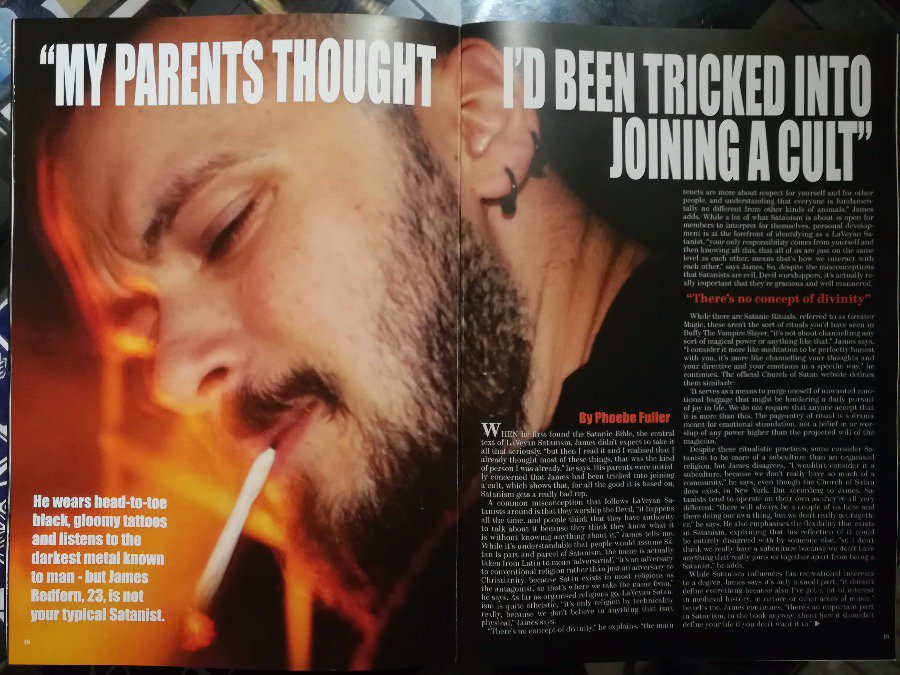"My parents thought I'd been tricked into joining a cult"

This article pictured in the magazine, designed by me on InDesign
When he first found the Satanic Bible, the central text of LaVeyan Satanism, James didn't expect to take it all that seriously, “but then I read it and I realised that I already thought most of these things, that was the kind of person I was already,” he says. His parents were initially concerned that James had been tricked into joining a cult, which shows that, for all the good it is based on, Satanism gets a really bad rep.
A common misconception that follows LaVeyan Satanists around is that they worship the Devil, “it happens all the time, and people think that they have authority to talk about it because they think they know what it is without knowing anything about it,” James tells me. While it's understandable that people would assume Satan is part and parcel of Satanism, the name is actually taken from Latin to mean 'adversarial', “it's an adversary to conventional religion rather than just an adversary to Christianity, because Satan exists in most religions as the antagonist, so that's where we take the name from,” he says. As far as organised religions go, LaVeyan Satanism is quite atheistic, “it's only religion by technicality really, because we don't believe in anything that isn't physical,” James says.
“There's no concept of divinity,” he explains, “the main tenets are more about respect for yourself and for other people, and understanding that everyone is fundamentally no different from other kinds of animals,” James adds. While a lot of what Satanism is about is open for members to interpret for themselves, personal development is at the forefront of identifying as a LaVeyan Satanist, “your only responsibility comes from yourself and then knowing all this, that all of us are just on the same level as each other, means that's how we interact with each other,” says James. So, despite the misconceptions that Satanists are evil, Devil worshippers, it's actually really important that they're gracious and well mannered.
While there are Satanic Rituals, referred to as Greater Magic, these aren't the sort of rituals you'd have seen in Buffy The Vampire Slayer, “it's not about channelling any sort of magical power or anything like that,” James says, “I consider it more like meditation to be perfectly honest with you, it's more like channelling your thoughts and your directive and your emotions in a specific way,” he continues. The official Church of Satan website defines them similarly:
'It serves as a means to purge oneself of unwanted emotional baggage that might be hindering a daily pursuit of joy in life. We do not require that anyone accept that it is more than this. The pageantry of ritual is a drama meant for emotional stimulation, not a belief in or worship of any power higher than the projected will of the magician.'
Despite these ritualistic practices, some consider Satanism to be more of a subculture than an organised religion, but James disagrees, “I wouldn't consider it a subculture, because we don't really have so much of a community,” he says, even though the Church of Satan does exist, in New York. But according to James, Satanists tend to operate on their own as they're all very different, “there will always be a couple of us here and there doing our own thing, but we don't really get together,” he says. He also emphasises the flexibility that exists in Satanism, explaining that his reflection of it could be entirely disagreed with by someone else, “so I don't think we really have a subculture because we don't have anything that really joins us together apart from being a Satanist,” he adds.
While Satanism influences his recreational interests to a degree, James says it's only a small part, “it doesn't define everything because also I've got a lot of interest in medieval history, in nature or other areas of music,” he tells me. James continues, “there's an important part in Satanism, in the book anyway, about how it shouldn't define your life if you don't want it to.” He explains:
“It says if you're a baker and you become a Satanist, you shouldn't just start baking cupcakes with pentagrams on the top, that's not how you should do it. What you should do is make the best cupcakes you possibly can. If you make these really, really good cupcakes and win loads of competitions and make them pink, when someone asks “what are your religious beliefs?” and you say “I'm a Satanist” in that way you will have hopefully changed someone's perception of it. And it shows anyone can enjoy it, anyone can be like this.”
Changing perceptions of Satanism is relatively important, because its members can be unjustly criticised for their beliefs. While James hasn't been on the receiving end of any serious prejudice himself, he says that he leant his copy of the Satanic Bible to a friend who had a nasty experience while reading it on a train, “some old woman on the train got up and tried to spit at him because he was reading it,” James tells me. However, he says the most common perception of Satanists is that they're just trying to be edgy, “that's the first assumption, that it's just like part of a package deal with being an angsty white boy who wears all black,” he says.
But, far from only appealing to angsty white boys, James believes that Satanism is a lot more diverse than most people would think, “it's not just contained to heterosexual men who are quite as anti-Christian as I am, there's a lot of variety to it,” he says. The moral of the story is as old as time, don't judge a book by its cover, you may very well be surprised.
